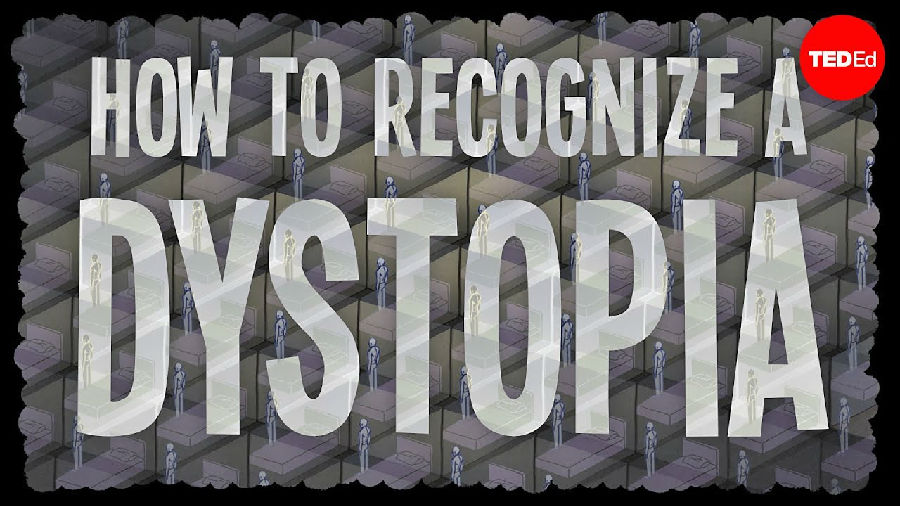(单词翻译:单击)
Have you ever tried to picture an ideal world?
你曾尝试想象过一个理想的世界吗?
One without war, poverty, or crime? If so, you're not alone.
一个没有战争、贫穷和犯罪的世界?如果有,那你并不是一个人。
Plato imagined an enlightened republic ruled by philosopher kings,
柏拉图想象了一个由顶尖哲学家统治的开化的共和国,
many religions promise bliss in the afterlife,
许多宗教都期望来世的极乐,
and throughout history, various groups have tried to build paradise on Earth.
并且纵观整个历史,许多群体都曾尝试在地球上创建天堂。
Thomas More's 1516 book 'Utopia' gave this concept a name, Greek for 'no place.'
托马斯·莫尔在1516年出版的书《乌托邦》给了这个概念一个名字,希腊语指“没有地方”。
Though the name suggested impossibility,
虽然这个名字暗指了不可能性,
modern scientific and political progress raised hopes of these dreams finally becoming reality.
但现代科学和政治的进步使实现这些梦想的希望最终变得现实。
But time and time again, they instead turned into nightmares of war, famine, and oppression.
但是一次又一次,它们相反地变成了战争、饥荒和压迫的噩梦。
And as artists began to question utopian thinking, the genre of dystopia, the not good place, was born.
并且当艺术家们开始质疑乌托邦的想法时,反乌托邦题材--“不好的地方”,应运而生。
One of the earliest dystopian works is Jonathan Swift's 'Gulliver's Travels.'
乔纳森·斯威夫特的《格列佛游记》是最早的反乌托邦题材作品之一。
Throughout his journey, Gulliver encounters fictional societies,
在他的整个旅行过程中,格列佛偶遇了一些虚构的社会,
some of which at first seem impressive, but turn out to be seriously flawed.
其中有一些起初看起来是使人敬畏的,但结果却是有严重缺陷的社会。
On the flying island of Laputa, scientists and social planners pursue extravagant and useless schemes
在格列佛游记中,科学家和社会规划师追寻夸张和无用的计划,
while neglecting the practical needs of the people below.
而忽视下层人的实际需要。
And the Houyhnhnm who live in perfectly logical harmony have no tolerance for the imperfections of actual human beings.
同时生活在完全合理的和谐中的Houyhnhnm人,一点也不能忍受人类的缺陷。
With his novel, Swift established a blueprint for dystopia,
在他的小说中,斯威夫特为反乌托邦构建了一个蓝图,
imagining a world where certain trends in contemporary society are taken to extremes, exposing their underlying flaws.
他想象了一个世界,在这个世界中存在在当代社会的某些趋势走向了极端,暴露出了它们潜在的问题。
And the next few centuries would provide plenty of material.
并且接下来的几个世纪里将会生产大量物资。
Industrial technology that promised to free laborers imprisoned them in slums and factories, instead,
工业技术的进步预示着体力劳动者的解放,取而代之的却是被关押在贫民窟和工厂,
while tycoons grew richer than kings.
而与此同时巨头们变得比国王更富有。
By the late 1800's, many feared where such conditions might lead.
到了19世纪末期,许多人开始担忧这种状况可能成为现实。
H. G. Wells's 'The Time Machine' imagined upper classes and workers evolving into separate species,
赫伯特·乔治·威尔斯在《时间机器》中想象上层社会和工人逐步进化成不同的人种,
while Jack London's 'The Iron Heel' portrayed a tyrannical oligarchy ruling over impoverished masses.
同时杰克·伦敦的《铁蹄》描绘了一个残暴的寡头政治,统治着贫穷的劳动阶层。

The new century brought more exciting and terrifying changes.
新的世纪带来了更多令人既兴奋又恐惧的变化。
Medical advances made it possible to transcend biological limits
医疗的进步使跨越生物界限成为可能,
while mass media allowed instant communication between leaders and the public.
同时大众传媒使领导者和公众之间的及时交流成为可能。
In Aldous Huxley's 'Brave New World', citizens are genetically engineered and conditioned to perform their social roles.
在阿道司·赫胥黎的《美丽新世界》中,每个公民的基因都是被设计过的,并根据社会角色接受相应的训练。
While propaganda and drugs keep the society happy, it's clear some crucial human element is lost.
政府宣传和药品让他们保持愉悦,显而易见的是,这些人被剥夺了人类最基本的特征。
But the best known dystopias were not imaginary at all.
但是众所周知的反乌托邦并不是虚幻的。
As Europe suffered unprecedented industrial warfare, new political movements took power.
就像欧洲经历了空前的工业革命,新的政治运动取得了统治权。
Some promised to erase all social distinctions, while others sought to unite people around a mythical heritage.
一些承诺要消除所有的社会差别,另一些则试图用一些虚构的事物将人们团结起来。
The results were real-world dystopias where life passed under the watchful eye of the State
导致的结果就是真实世界的反乌托邦,人们一生都活在监视下,
and death came with ruthless efficiency to any who didn't belong.
不遵守规则的人将会被无情地处死。
Many writers of the time didn't just observe these horrors, but lived through them.
在那个时代,作家们不仅仅是发现了这些恐惧,还经历了它们。
In his novel 'We', Soviet writer Yevgeny Zamyatin described a future where free will and individuality were eliminated.
苏联作家叶夫根尼·萨米尔钦在他的小说《我们》中,描述了一个自由意志和个体特征都被消灭了的未来。
Banned in the U.S.S.R., the book inspired authors
尽管苏联将它列为禁书,它仍鼓舞了一些作家,
like George Orwell who fought on the front lines against both fascism and communism.
比如奋斗在共产主义和反法西斯主义前线的乔治·奥威尔。
While his novel 'Animal Farm' directly mocked the Soviet regime,
他的小说《动物农场》直接嘲讽了苏维埃政权,
the classic '1984' was a broader critique of totalitarianism, media, and language.
经典的《1984》则是对集权主义、媒体和语言更广泛的批判。
And in the U.S.A., Sinclair Lewis's 'It Can't Happen Here' envisioned how easily democracy gave way to fascism.
并且在美国,辛克莱·刘易斯的《不会发生在这里》想象了民主政体被法西斯取代是多么容易。
In the decades after World War II, writers wondered what new technologies like atomic energy,
在二战后的几十年里,作家们想知道新科技,比如原子能、
artificial intelligence, and space travel meant for humanity's future.
人工智能、太空旅行,将对人类的未来产生怎样的影响。
Contrasting with popular visions of shining progress, dystopian science fiction expanded to films, comics, and games.
与广为流传的、赞美科学进步的观点相比,反乌托邦科学小说拓展到了电影、喜剧和游戏。
Robots turned against their creators while TV screens broadcast deadly mass entertainment.
机器人们转向反抗他们的制造者,与此同时电视上播放着乏味的大众娱乐。
Workers toiled in space colonies above an Earth of depleted resources and overpopulated, crime-plagued cities.
工人们在太空殖民地辛勤工作,它在资源耗尽、人口过多、犯罪侵扰城市的地球上空。
Yet politics was never far away.
然而政治从未消失。
Works like 'Dr. Strangelove' and 'Watchmen' explored the real threat of nuclear war,
像《奇爱博士》和《守望者》这样的作品探究了核战争带来的真正威胁,
while 'V for Vendetta' and 'The Handmaid's Tale' warned how easily our rights could disappear in a crisis.
同时《V字仇杀队》和《女仆的故事》告诫了在危机中我们的权利多么容易丧失。
And today's dystopian fiction continues to reflect modern anxieties
现今的反乌托邦小说继续反映着当代的焦虑,
about inequality, climate change, government power, and global epidemics.
关于不平等、气候变化、政府权力和全球性的流行病。
So why bother with all this pessimism?
那么他们为什么会想象出如此悲观的世界呢?
Because at their heart, dystopias are cautionary tales, not about some particular government or technology,
因为在他们心中,反乌托邦的作品都是警示故事,不是关于一些特定的政府或技术,
but the very idea that humanity can be molded into an ideal shape.
而是人类可以被塑造成一个理想的模型这个观点。
Think back to the perfect world you imagined.
回忆一下你想象中的完美世界。
Did you also imagine what it would take to achieve?
你思考过要怎么样才能实现吗?
How would you make people cooperate? And how would you make sure it lasted?
你怎样让人们合作?还有你将如何确保它延续下去?
Now take another look. Does that world still seem perfect?
现在再想想。那个世界依旧看起来完美吗?


